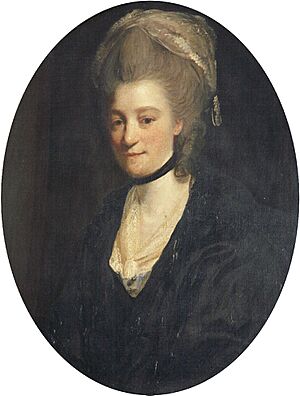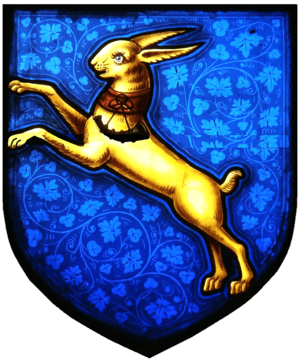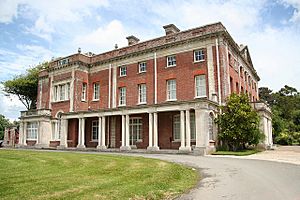John Clevland (1706–1763) facts for kids
Quick facts for kids
John Clevland
|
|
|---|---|
| Member of Parliament for Saltash | |
| In office 1754–1761 Serving with George Clinton
|
|
| Preceded by | Charles Townshend George Clinton |
| Succeeded by | George Adams Hon. Augustus Hervey |
| In office 1741–1743 Serving with Thomas Corbett
|
|
| Preceded by | Lord Glenorchy Thomas Corbett |
| Succeeded by | Thomas Corbett Stamp Brooksbank |
| Member of Parliament for Sandwich | |
| In office 1747–1761 Serving with Sir George Oxenden, Bt, Claudius Amyand, The Viscount Conyngham
|
|
| Preceded by | John Pratt Sir George Oxenden, Bt |
| Succeeded by | The Viscount Conyngham George Hay |
| Secretary to the Admiralty | |
| In office 30 April 1751 – 18 June 1763 |
|
| Preceded by | Thomas Corbett |
| Succeeded by | Philip Stephens |
| Personal details | |
| Born | c. 1706 |
| Died | 19 June 1763 (aged 56–57) Tapeley Park |
| Spouses |
Elizabeth Child
(m. 1729, Penelope Davie
(m. 1743, Sarah Shuckburgh
(after 1747) |
| Relations | William Clevland (brother) John Davie (grandfather) |
| Parents | William Clevland Ann Davie |
John Clevland (born around 1706 – died June 19, 1763) was an important person in the British government. He worked as the Secretary to the Admiralty, which was a very high-ranking job in the Royal Navy. He was also a Member of Parliament (MP) for two different areas: Saltash in Devon and Sandwich in Kent.
Early Life and Family
John Clevland was the oldest son of Commander William Clevland of the Royal Navy. His mother was Ann Davie, from an old family in Devon. John's father was born in Scotland and worked for the Navy Board, managing their accounts.
John had a brother named William Clevland. Interestingly, William became known as the "King of the Banana Islands" in Sierra Leone after his ship was wrecked there.
John's grandfather on his mother's side was John Davie, a well-known merchant from Orleigh Court near Bideford.
John went to school at Westminster in 1718. Later, he studied law at Middle Temple in 1723. When his father passed away in 1734, John inherited Tapeley Park in North Devon.
A Career in Government
John Clevland's father helped him start his career in government. John first worked as a clerk and then as a chief clerk at the Navy Board from 1726 to 1731. The Navy Board was in charge of managing the Royal Navy's ships and supplies.
In 1731, John became a Clerk at Plymouth, a major naval port. He continued to rise through the ranks. In 1744, he became the Clerk of the Acts. By 1748, he was a Joint Secretary to the Lords Commissioners of the Admiralty. This group oversaw the entire Royal Navy. In 1751, he became the main Secretary to the Admiralty. This was a very powerful position, like being the chief operating officer for the entire British Navy.
Besides his work for the Navy, John Clevland was also a Member of Parliament (MP). An MP is someone elected to represent a local area in the country's government. He represented Saltash from 1741 to 1743. Then he represented Sandwich from 1747 to 1761. He returned to represent Saltash again from 1761 until his death in 1763.
Around 1750, he bought the title of lordship for the nearby Manor of Bideford. At that time, Bideford was a very important port in the country.
Personal Life and Family

John Clevland was married three times and had many children.
His first marriage was in 1729 to Elizabeth Child. They had three sons and three daughters. One of their sons was John Clevland II (1734–1817). He also became an MP for Barnstaple. Their daughter, Hester Clevland, married Captain William Saltren-Willett of the Royal Navy.
After Elizabeth passed away, John married his cousin, Penelope Davie, in 1743. They had one son together.
His third marriage was in 1747 to Sarah Shuckburgh. With Sarah, he had two more sons and two daughters. One of their sons was Augustus Clevland (1754–1784). Augustus became an officer for the East India Company in India. Their daughter, Selina Shore Clevland, married John Udny, who was a British Consul in Italy.
John Clevland passed away at his home, Tapeley, on June 18, 1763. He had been very dedicated to his job as Secretary of the Admiralty. His hard work led to health problems, which caused his death.
Images for kids
 | Jackie Robinson |
 | Jack Johnson |
 | Althea Gibson |
 | Arthur Ashe |
 | Muhammad Ali |




